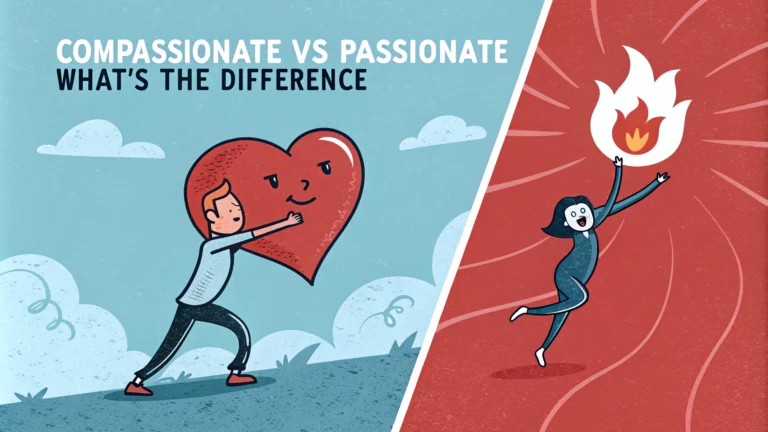Compassion and passion are often confused, yet they’re distinct qualities that shape our interactions and pursuits. This article explores the key differences between being compassionate and passionate, helping you harness both traits effectively in your personal and professional life.We’ll examine how compassion fosters empathy and connection, while passion fuels drive and ambition. You’ll learn practical ways to balance these qualities, enhancing your relationships and achieving your goals with greater emotional intelligence.
The Core of Compassion
Compassion is rooted in empathy and the desire to alleviate others’ suffering. It involves:
- Recognizing others’ emotions
- Feeling motivated to help
- Taking action to support others
Compassionate individuals often exhibit:
- Active listening skills
- Patience and understanding
- Selfless acts of kindness
The Essence of Passion
Passion is an intense enthusiasm or desire for something. It’s characterized by:
- Strong emotional investment
- Unwavering dedication
- Persistent pursuit of goals
Passionate people typically display:
- High energy and motivation
- Resilience in face of obstacles
- Deep focus on their interests
Key Differences in Action
While compassion and passion can coexist, they often manifest differently:
| Compassion | Passion |
|---|---|
| Focused on others | Often self-directed |
| Seeks to understand and help | Pursues personal goals |
| Calm and patient approach | Energetic and driven attitude |
Understanding these differences helps in recognizing when to apply each trait appropriately in various situations.
Balancing Compassion and Passion
Integrating both qualities can lead to a more fulfilling life:1. Practice self-awareness to recognize your emotional state2. Set boundaries to prevent burnout from excessive compassion3. Channel passion into compassionate causes4. Use compassion to temper passionate pursuitsBy striking a balance, you can pursue your goals while maintaining empathy for others.
Developing Emotional Intelligence
Balancing compassion and passion requires emotional intelligence. To improve your EQ:
- Practice self-reflection
- Seek feedback from others
- Learn to recognize emotional triggers
- Develop strategies for emotional regulation
By enhancing your emotional intelligence, you’ll better navigate the interplay between compassion and passion in various situations.
Applying Compassion in Professional Settings
Compassion in the workplace fosters a positive environment and improves team dynamics. Consider these strategies:
- Implement active listening techniques in meetings
- Offer support to colleagues facing challenges
- Create mentorship programs to share knowledge
Case study: A manager who adopted a compassionate leadership style saw a 20% increase in team productivity and a 15% decrease in employee turnover.
Harnessing Passion for Personal Growth
Passion can be a powerful driver for personal development. To leverage your passions effectively:
- Identify your core interests and values
- Set challenging but achievable goals
- Develop a growth mindset to overcome obstacles
- Seek out learning opportunities related to your passions
Remember, passion without direction can lead to burnout. Channel your enthusiasm into structured pursuits for lasting fulfillment.
Finding Harmony: The Compassionate-Passionate Approach
Integrating compassion and passion creates a balanced approach to life and work. This harmony leads to:
- Improved relationships and communication
- Greater job satisfaction and performance
- Enhanced personal well-being and resilience
To achieve this balance:
- Reflect on your actions and motivations regularly
- Practice empathy in your passionate pursuits
- Use your passions to fuel compassionate initiatives
By combining the strength of passion with the warmth of compassion, you’ll create a more fulfilling and impactful life journey.
FAQs: Compassionate vs. Passionate
1. What’s the difference between compassionate and passionate?
Compassionate refers to showing empathy and concern for others, while passionate describes intense enthusiasm or strong feelings about something.
2. Can someone be both compassionate and passionate?
Yes, it’s possible to be both. For example, a person can be passionate about a cause and compassionate towards those affected by it.
3. How does compassion affect relationships?
Compassion in relationships can lead to:
- Increased understanding
- Better communication
- Stronger emotional bonds
- Improved conflict resolution
4. What are the benefits of being passionate in your career?
Being passionate about your work can result in:
- Higher job satisfaction
- Increased productivity
- Better problem-solving skills
- Career advancement opportunities
5. Is compassionate leadership more effective than passionate leadership?
Both styles have their merits. Compassionate leadership often leads to better team cohesion and employee well-being, while passionate leadership can inspire and motivate teams to achieve goals.
6. How can I cultivate compassion in my daily life?
To develop compassion:
- Practice active listening
- Volunteer for charitable causes
- Engage in mindfulness meditation
- Challenge your biases and assumptions
7. What are the potential drawbacks of being too passionate?
Excessive passion can sometimes lead to:
- Burnout
- Neglect of other important aspects of life
- Difficulty accepting criticism
- Inflexibility in decision-making
8. How does compassion fatigue differ from burnout?
Compassion fatigue is specific to caring professions and results from prolonged exposure to others’ suffering. Burnout can occur in any profession and is characterized by general exhaustion and disengagement.
9. Can passion be learned or is it innate?
While some people may naturally feel more passionate about certain things, passion can be cultivated through:
- Exploring new interests
- Setting meaningful goals
- Connecting with like-minded individuals
- Continuous learning and skill development
10. What role does empathy play in compassion?
Empathy is the ability to understand and share the feelings of others, which is a crucial component of compassion. It allows individuals to respond to others’ needs with genuine care and concern.
11. How can businesses balance passion for profit with compassion for employees?
Companies can achieve this balance by:
- Implementing fair compensation and benefits
- Fostering a positive work environment
- Offering professional development opportunities
- Supporting work-life balance initiatives
12. What are the health benefits of practicing compassion?
Research suggests that practicing compassion can lead to:
| Physical Benefits | Mental Benefits |
|---|---|
| Lower blood pressure | Reduced stress and anxiety |
| Improved immune function | Increased happiness and life satisfaction |
| Better sleep quality | Enhanced emotional resilience |



















